| Srl | Item |
| 1 |
ID:
131957


|
|
|
|
|
| Publication |
2014.
|
| Summary/Abstract |
Existing literature has long recognized that a partnership has been forged between the PRC government and Hong Kong's capitalist class. However, the implications of such a partnership for HKSAR governance have yet to be thoroughly explored. By examining the formation of this partnership and its consolidation after 1997, this article argues that the business sector's direct access to the sovereign state has fundamentally changed the dynamics of state-business relations in the HKSAR. As a consequence of the partnership between Beijing and the business sector, business elites have taken their concerns straight to the mainland authorities whenever they see their interests affected by the post-colonial state. This kind of circumvention has become a part of post-1997 politics, undermining the relative autonomy of the post-colonial state and resulting in growing cleavages within the state-business alliance during the first 15 years of the HKSAR. Whether and how such a partnership will evolve in the aftermath of the 2012 chief executive election remains to be seen.
|
|
|
|
|
|
|
|
|
|
|
|
|
|
|
|
| 2 |
ID:
131956
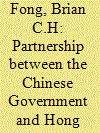

|
|
|
|
|
| Summary/Abstract |
Existing literature has long recognized that a partnership has been forged between the PRC government and Hong Kong's capitalist class. However, the implications of such a partnership for HKSAR governance have yet to be thoroughly explored. By examining the formation of this partnership and its consolidation after 1997, this article argues that the business sector's direct access to the sovereign state has fundamentally changed the dynamics of state-business relations in the HKSAR. As a consequence of the partnership between Beijing and the business sector, business elites have taken their concerns straight to the mainland authorities whenever they see their interests affected by the post-colonial state. This kind of circumvention has become a part of post-1997 politics, undermining the relative autonomy of the post-colonial state and resulting in growing cleavages within the state-business alliance during the first 15 years of the HKSAR. Whether and how such a partnership will evolve in the aftermath of the 2012 chief executive election remains to be seen.
|
|
|
|
|
|
|
|
|
|
|
|
|
|
|
|
| 3 |
ID:
131000
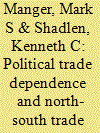

|
|
|
|
|
| Publication |
2014.
|
| Summary/Abstract |
Why do developing countries negotiate North-South trade agreements, when they already enjoy preferential market access to developed-country markets? Most developing countries benefit from the generalized system of preferences (GSP) and related schemes when they export to the United States, the EU, and other developed economies. And yet, many pursue fully reciprocal agreements that require major concessions to the developed partner. We argue that this is due to the nature of the GSP as a unilateral concession that can be (and often is) taken away. High dependence on unilateral, removable preferences generates "political trade dependence" (PTD). We distinguish PTD from standard measures of trade dependence, and we explain why PTD motivates developing countries to seek North-South Regional Trade Agreements (RTAs). We show the effects of PTD with a selection of illustrative cases and test our hypothesis on a data set of EU and US trade agreements with developing countries. We find robust statistical support for our hypothesis that high and rising levels of PTD make the negotiation of a North-South RTA more likely.
|
|
|
|
|
|
|
|
|
|
|
|
|
|
|
|
| 4 |
ID:
132708
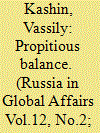

|
|
|
|
|
| Publication |
2014.
|
| Summary/Abstract |
The Ukrainian crisis has demonstrated once again that the global Chinese business empire is growing much faster than Beijing's military-political capabilities. There has again emerged a need for a more active Chinese policy to protect national interests.
|
|
|
|
|
|
|
|
|
|
|
|
|
|
|
|
| 5 |
ID:
131361
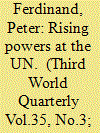

|
|
|
|
|
| Publication |
2014.
|
| Summary/Abstract |
This article examines the long-term trends of foreign policy convergence of Brazil, Russia, India, China and South Africa (BRICS) to determine the similarity of their positions on world issues, as they seek to 'insert' themselves more fully into global decision making. The analysis is based upon their votes in the UN General Assembly. The article compiles two indexes of voting for the period 1974-2011. Both demonstrate a high and now growing degree of cohesion among BRICS. Their voting is broken down by pairs to show common themes and the major issue divergences, and how often individual states voted with others. Nuclear disarmament and human rights are the two areas that reveal persisting divergences between these states.
|
|
|
|
|
|
|
|
|
|
|
|
|
|
|
|
| 6 |
ID:
131002
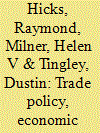

|
|
|
|
|
| Publication |
2014.
|
| Summary/Abstract |
Developing countries have increasingly opened their economies to trade. Research about trade policy in developed countries focuses on a bottom-up process by identifying economic preferences of domestic groups. We know less about developing countries. We analyze how economic and political variables influenced Costa Rican voters in a referendum on CAFTA-DR, an international trade agreement. We find little support for Stolper-Samuelson models of economic preferences, but more support for specific factor models. We also isolate the effects of political parties on the referendum, controlling for many economic factors; we document how at least one party influenced voters and this made the difference for CAFTA-DR passage. Politics, namely parties using their organizational strength to cue and frame messages for voters, influenced this important trade policy decision. Theories about trade policy need to take into account top-down political factors along with economic interests.
|
|
|
|
|
|
|
|
|
|
|
|
|
|
|
|
| 7 |
ID:
129211
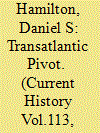

|
|
|
|
|
| Publication |
2014.
|
| Summary/Abstract |
A quarter century after the fall of the Berlin Wall, relations between the United States and Europe have evolved from a single-minded focus on stabilizing the European continent into more diffuse security, economic, and diplomatic agendas encompassing three broad elements. The first is ensuring the continued
vitality of the transatlantic alliance while taming the turbulent spaces of wider Europe. The second is guaranteeing mutual economic recovery while harnessing deep integration to create jobs and fuel growth, and also repositioning Europe and the United States for a world of emerging economies. The third is addressing a range of regional and global challenges, from energy security and nonproliferation to Middle Eastern turmoil and uncertain Asian dynamics.
|
|
|
|
|
|
|
|
|
|
|
|
|
|
|
|